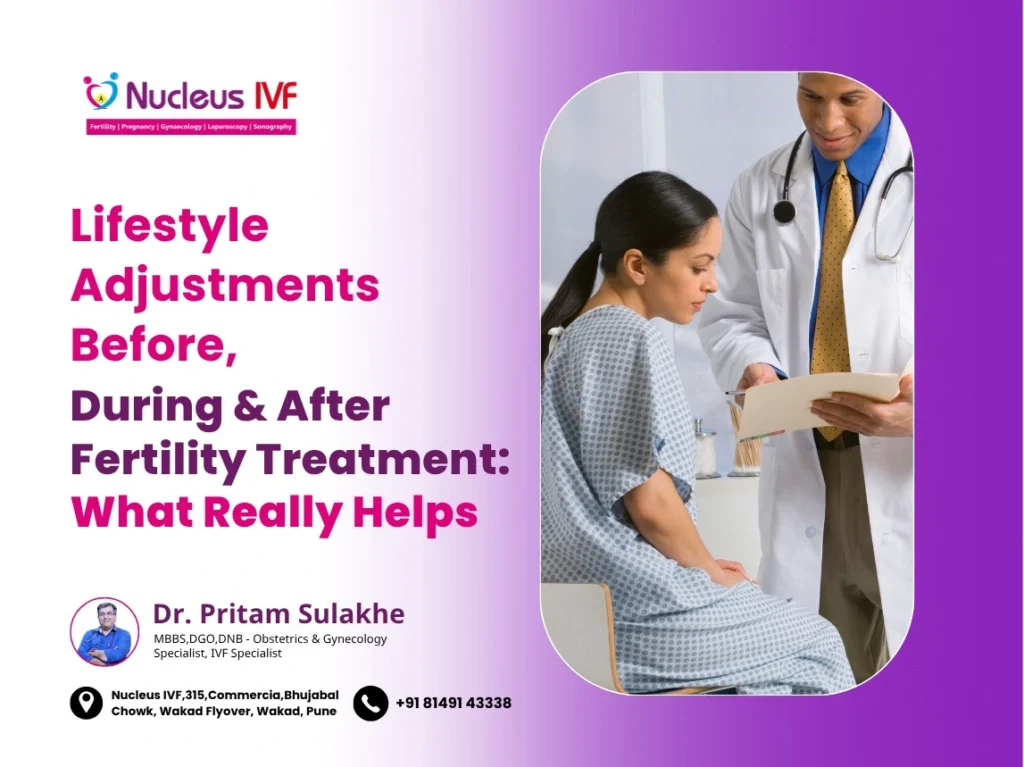Fertility treatment is a journey that involves not just medical care but also a holistic shift in how you live, eat, sleep, and manage stress. As Dr. Pritam Sulakhe emphasizes, your lifestyle can significantly influence treatment outcomes. Small, consistent adjustments—made at the right time can support your body, improve overall well-being, and enhance your chances of success.
Here’s a practical guide on the lifestyle changes that truly make a difference before, during, and after fertility treatment.

Before Treatment: Preparing the Body & Mind
1. Achieve a Healthy Weight
Both underweight and overweight individuals may face hormonal imbalance, irregular cycles, and reduced sperm quality. Aim for a BMI in the healthy range, but avoid crash dieting. Slow, steady improvements work best.
2. Improve Your Diet
Focus on a fertility-supportive diet rich in:
- Fresh fruits and vegetables
- Whole grains
- Lean proteins
- Healthy fats
Reduce processed foods, added sugars, and excessive caffeine.
3. Start Taking Essential Supplements
Folic acid, vitamin D, and antioxidants (like CoQ10) can support reproductive health. Always consult your doctor before starting supplements.
4. Quit Alcohol, Smoking, and Recreational Drugs
These negatively impact ovarian reserve, egg quality, and sperm health.
5. Manage Stress Early
Yoga, meditation, journaling, or breathing exercises can help balance your emotional state before treatment begins.
During Treatment: Supporting Your Body Through the Process
1. Eat Balanced, Nourishing Meals
Hormonal medications may cause bloating or digestive changes. Choose light, nutrient-dense meals and hydrate well. Avoid raw or undercooked foods.
2. Exercise—But Gently
Walking, stretching, and light yoga are safe. Avoid high-intensity workouts, heavy lifting, or activities that increase ovarian torsion risk.
3. Prioritize Restful Sleep
Aim for 7–9 hours of sleep. Create a relaxing bedtime routine and reduce screen time.
4. Take Medications on Schedule
Follow your prescribed medication and injection timings consistently. Use reminders to avoid missed doses.
5. Keep Emotional Well-Being in Focus
Treatment cycles can feel overwhelming. Speaking to a counselor or joining a support group can help you stay centered.
After Treatment: Recovery & Preparing for the Next Step
1. Continue Healthy Eating & Hydration
Your body needs time to recover from medications. Nourishing foods help restore balance whether pregnancy occurs or you prepare for the next cycle.
2. Follow Activity Guidelines
After embryo transfer or procedures, avoid intense exercise and heavy lifting. Light movement is usually safe.
3. Stay Emotionally Balanced
The two-week wait can be stressful. Engage in calming activities, maintain routine, and avoid excessive online searching.
4. Avoid Alcohol & Smoking After Transfer
Even before pregnancy is confirmed, protecting embryo development is essential.
5. Maintain Regular Communication With Your Care Team
Report any unusual symptoms and keep up with scheduled follow-ups.
What Truly Makes the Biggest Difference?
- Consistency over drastic changes
- Balanced nutrition rather than restrictive diets
- Safe, moderate exercise
- Daily stress-management habits
- Clear communication with your fertility doctor
- Strong emotional support
Lifestyle adjustments don’t replace medical treatment, but they strengthen it—creating the best possible environment for conception and a healthy pregnancy.
Dr. Pritam Prakash Sulakhe
Dr. Pritam Prakash Sulakhe
author
Dr. Pritam Prakash Sulakhe has completed his MBBS from B J Government Medical College , Pune which is one of the top medical College in India. He continued his post-graduation as DGO at same institute. After that he opted for Diplomat Of national Board In Obstetrics and Gynecology from Kerala Institute Of Medical Sciences Trivandrum, which is one of the most prestigious institute from South India.


